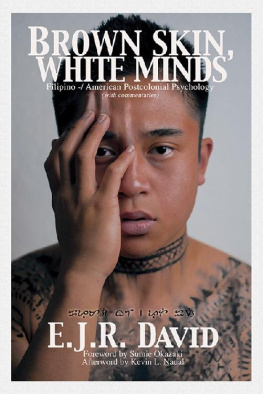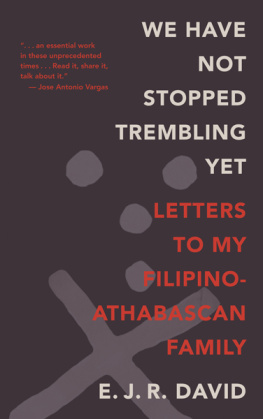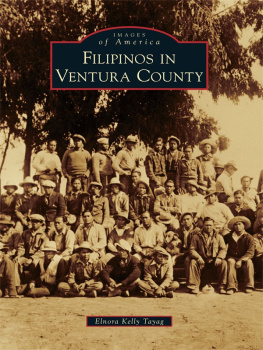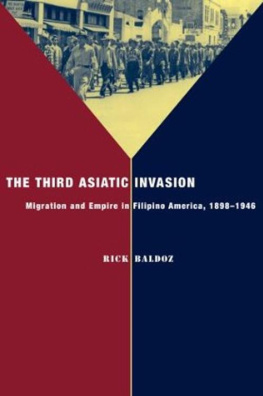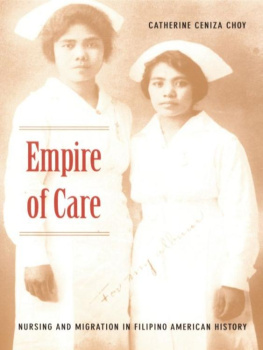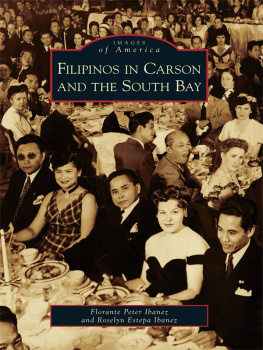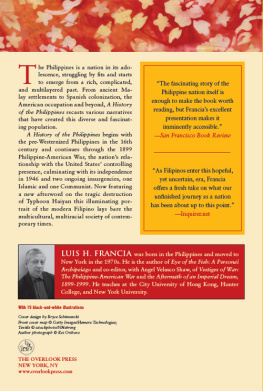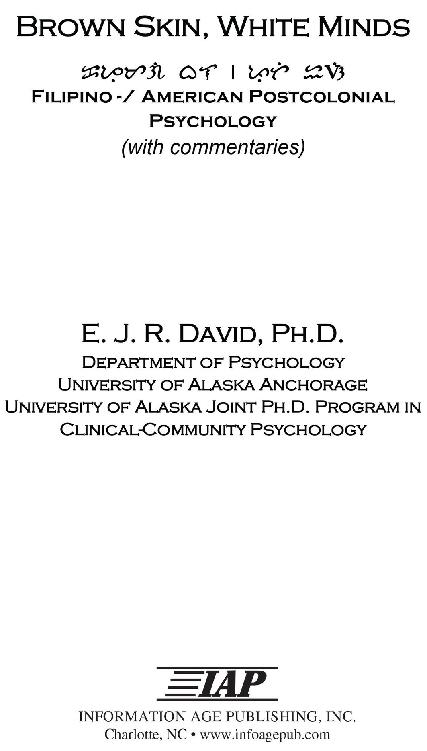A CIP record for this book is available from the Library of Congress http://www.loc.gov
Copyright 2013 Information Age Publishing Inc.
All rights reserved. No part of this publication may be reproduced, stored in a retrieval system, or transmitted, in any form or by any means, electronic, mechanical, photocopying, microfilming, recording or otherwise, without written permission from the publisher.
FOREWORD
By
Sumie Okazaki, Ph.D.
Like many books, this book is a labor of love. It is a culmination of a programmatic research in psychology carried out with scientific rigor but also born out of passion. Now, many mental health scholars including myself do care deeply about the subject matter and the population that we study. Our scholarship is motivated in part by a belief that our work has some positive impact on the little corner of the world that we study and write about. However, more than any other scholar with whom I have had the privilege to work, Dr. E. J. R. David has carried out his work out of deep love and commitment to the community. Dr. Davids work is passionate to the extent that it arouses many collective emotions anger at the centuries of historical oppression of Filipinos, sorrow for the lives lost to suicides and depression, dismay at the insidious and long-lasting nature of the legacy of colonialism, and the urgency to right the course for the communitys psyche.
Dr. David was one of my doctoral students at the University of Illinois at Urbana-Champaign. As with many students who gain admission to a selective doctoral program in clinical-community psychology, Dr. Davids undergraduate advisors at the University of Alaska Anchorage endorsed his scholarly potential with enthusiasm. His mentors at Alaska raved about his intellect, his work ethic, and his commitment to psychology as a scientific enterprise. And his time at Illinois proved not only that his undergraduate advisors knew a gem when they saw one, Dr. David was indeed a rare scholar who is inordinately capable and productive yet also extraordinarily grounded.
Dr. David brought his research ideas about Colonial Mentality the subject of this book to Illinois. Upon arriving in Illinois, he hit the ground running and has been running fast and steady ever since. My task as his research mentor was to slow him down just enough at the beginning to theorize about the nature of colonial mentality before plowing ahead full-force with the research program. In retrospect, this step was perhaps more for my edification as an Asian American mental health scholar who knew so embarrassingly little about dialogues within the Filipino American community.
The series of studies that Dr. David carried out under my guidance during his graduate career are systematic and rigorous. He first worked to present the theoretical framework for colonial mentality, next to develop and validate a questionnaire on colonial mentality, then to develop tools to examine colonial mentality at the implicit or subconscious level, and to demonstrate the relationship between colonial mentality and psychological distress among Filipino Americans. Whatever scientific tools he needed to accomplish the next step, Dr. David mastered with ease and speed; the rest of us watched in awe at his productivity and singular commitment to his scholarship. Yet I knew that Dr. Davids work was driven not by ambitions for academic glory but by his wish to give away psychology to the community a principle that is essential for any community psychology scholar. During his graduate school years, Dr. David devoted his effort to outreach to the Filipino American community through media appearances, teaching, and the development of an intervention to reduce colonial mentality among Filipino Americans. At the same time, he quietly toiled for years to bring first his brother and then his mother from the Philippines to the United States. He also managed to keep up the long-distance relationship with his high school sweetheart, now his wife.
And to this day, Dr. David continues to be a prolific scholar, as evidenced by the very existence of this book. In an academic discipline that does not necessarily value book publications, the initial edition of this book - Filipino -/ American Postcolonial Psychology: Oppression, Colonial Mentality, and Decolonization - was written by a junior assistant professor with a full set of teaching, was written by a junior assistant professor with a full set of teaching, service, and research demands and a new father to a baby boy. Now, this revised version Brown Skin, White Minds: Filipino -/ American Postcolonial Psychology was accomplished while Dr. David was raising three very young children with his wife. I write all this not to embarrass E.J., as he is known to many, but as a testament to the notion that academic productivity does not necessarily mean shortchanging other important life commitments. When a scholar engages in a work that has the potential to really mean something to the community, as Dr. David has done and continues to do, there is an urgency to disseminate the work as widely and effectively as possible. And this book fully realizes that potential to make a difference in the Filipino -/ American community. The book also teaches us Filipino or non-Filipino the sheer importance of understanding the historical context for our contemporary psychological experiences. It is, then, not at all surprising that the first edition of this book has already achieved critical praise as well as a large community support. I am happy, not only for Dr. David for his success, but also for the larger community of scholars, students, and community members who will now be able to access this important work.
Finally while I have this forum, I would like to take the opportunity to set the record straight. As his graduate mentor, I have benefitted quite a bit myself from the reflected glory of Dr. Davids scholarship. It is not unusual for me to have students and scholars that I do not know contact me to tell me how much they have liked my work on colonial mentality. However, as much as I would love to claim credit, the credit belongs to Dr. David. I am just pleased that I was invited on the ground floor for this important ride.
Sumie Okazaki, Ph.D.
Professor of Applied Psychology
New York University
PREFACE
I was born and raised in the Philippines during the 1980s. My father began working in the United States when I was around four years-old, and as I was growing up, he regularly sent me VHS tapes of recorded shows from various children TV stations such as the Cartoon Channel. My mom would sit me in front of the TV to watch these tapes as she cooked, cleaned the house, or did other errands. What my father did was press the record button on his VHS player every morning before he went to work, and the machine continuously recorded countless different shows until the tape ran out. While spending hours watching these gifts from my father, I remember seeing the advertisements that were recorded in such tapes. I saw blonde- or brown-haired, blue-eyed, light-skinned kids playing with the coolest toys I had ever seen. It made me want to have what they had. I remember seeing those kids having the time of their lives in Disneyland, Universal Studios, or other theme parks. I wanted to go where they were.

